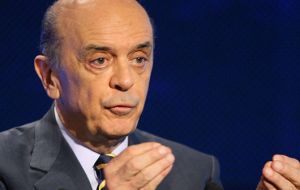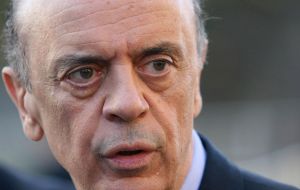MercoPress. South Atlantic News Agency
Brazil's economic interests will prevail over ideological goals, says new foreign minister
 “Diplomacy will return to transparently and firmly reflecting the legitimate values of Brazilian society and the interests of its economy” underlined Serra
“Diplomacy will return to transparently and firmly reflecting the legitimate values of Brazilian society and the interests of its economy” underlined Serra  Serra has already confronted the governments of Bolivia, Cuba, Ecuador, Nicaragua and Venezuela, which had denounced Temer's takeover as a coup
Serra has already confronted the governments of Bolivia, Cuba, Ecuador, Nicaragua and Venezuela, which had denounced Temer's takeover as a coup The foreign minister for Brazil's new government following the suspension of president Dilma Rousseff said that Brasilia will now pursue economic interests over ideological goals. Jose Serra, nominated by acting president Michel Temer in the wake of Rousseff's suspension for an impeachment trial, signaled that Brazil would no longer be part of the loose left/leaning alliance that exists across several Latin American countries.
“Diplomacy will return to transparently and firmly reflecting the legitimate values of Brazilian society and the interests of its economy, serving Brazil as a whole and no longer the ... ideological preferences of a political party and its foreign allies,” he said.
Serra last week confronted the governments of Bolivia, Cuba, Ecuador, Nicaragua and Venezuela, which had denounced Temer's takeover as a coup against Rousseff.
Serra said that Brazil would play “a pioneering role” in climate change policies, underlining the country's role as guardian of most of the Amazon rain forest and some of the world's biggest supplies of fresh water.
Serra underlined that Brazil's foreign policy and interests will also target economic powers such as China and India. “Relations with new partners in Asia, especially China, this great economic phenomenon of the 21st century, and India, will be a priority”.
Since 2009, China has been Brazil’s top trade partner and one of its leading foreign investors. One of Serra's first moves on becoming foreign minister was to contact Brazil's ambassador in Beijing, Roberto Jaguaribe.
“Roberto is working to court Chinese capital to Brazil to invest along with Brazil’s government in infrastructure works. That effort will be intensified, I’m certain,” said Serra.
The new Foreign Minister also said the ministry will focus on bilateral trade treaties, reducing its dependence on the WTO.
“Brazil will no longer restrict its freedom and the breadth of its initiatives for an exclusive, paralyzing adhesion to multilateral efforts within the framework of the World Trade Organization (WTO), as was the case since the past decade, to the detriment of the country’s own interests,” the new foreign minister said.
As long as Brazil “clings” to this multilateral effort, it will remain a bystander as “bilateral free-trade agreements multiply”, Serra warned.
“The multilateralism that hasn’t come to mature has detracted from the bilateralism that thrived around the world,” he added.
Boosting trade and diplomatic ties with longtime partners the United States, the European Union and Japan, which in recent years took a back seat to regional integration and multilateral forums, does not run counter to Brazil’s push to forge ties with new partners, said Serra.
“A country the size of Brazil does not choose or refuse alliances, it actively pursues them all, driven by its national interests,” said Serra.
Serra underlined that ties with Africa will be “partnerships of the present and the future” and not based on “fraternal ties from the past”.
Remarking on the previous administration’s championing on South-South cooperation, Serra said that would continue to be an “essential guideline” of Brazilian foreign policy.
“But we mean the correct South-South strategy, not the one that was once put into effect for advertising purposes, scarce economic benefits and major diplomatic investments”, he said.
Brazil will “not follow the conveniences and ideological preferences of a political party and its allies abroad any more”, the new Minister warned while stressing that it will aim to sponsor defense of democracy, liberties and human rights in any country and political regime, as established in international treaties.




Top Comments
Disclaimer & comment rules-

-

-

Read all comments“Diplomacy will return to transparently and firmly reflecting the legitimate values of Brazilian society and the interests of its economy, serving Brazil as a whole and no longer the ... ideological preferences of a political party and its foreign allies,” he said.
May 20th, 2016 - 06:43 pm 0He's not talking about St. Lula and his acolytes of crooks is he? Surely not!
World cup? Olympics?
May 21st, 2016 - 09:01 am 0Lipstick on a pig.
Whose “economic interests” is he referring to?
May 23rd, 2016 - 10:35 am 0Commenting for this story is now closed.
If you have a Facebook account, become a fan and comment on our Facebook Page!